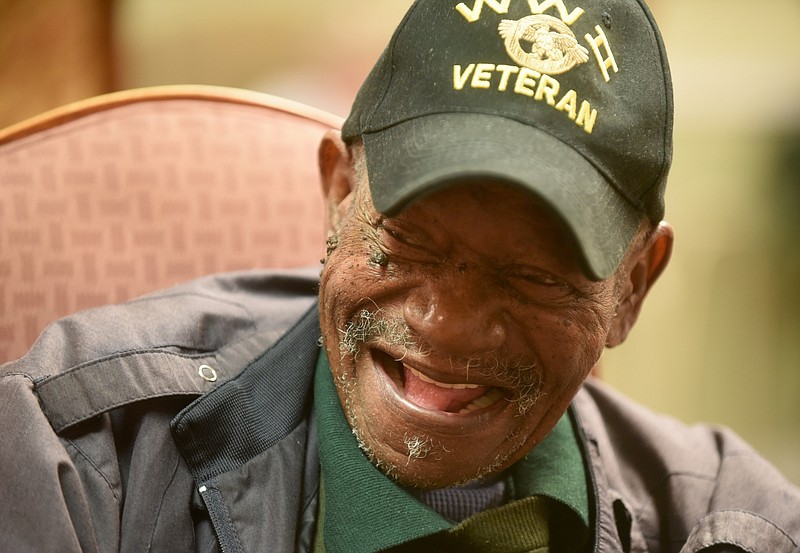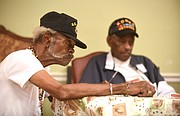Robert Porter sleeps on a broken hospital bed donated from Goodwill and rides in his wife's broken wheelchair. The bed won't properly adjust, so his back is up and his legs won't go down. The motorized wheelchair allows him to start a trip to the store, but the motor often stops on him and he has to wait, sometimes an hour, before it starts again.
The 55-year-old U.S. Army veteran served from 1980-1984; he also served nine years in the Army Reserve. He asked the U.S. Veterans Administration for a new bed and wheelchair in May but has yet to get them.
He's also asked the VA to provide a hospital bed for his wife, Wanda, who's bedridden after a stroke in 2003. She must sleep partially sitting up because the bed she has won't lay flat.
Not surprisingly, Porter also suffers from depression.
Instead of going to a nursing home, he wants to remain in his own house so he can care for his wife. And he also wants to visit an adult day care facility a few days a week where he can spend time interacting with other veterans.
He's on a new electronic waiting list for the bed, the wheelchair and the day care but hasn't heard back from the VA.
"Are they waiting for me to die?" Porter asked.
For the first time in at least two decades, the VA is using the electronic waiting list for veterans requesting in-home health care and adult day care services, according to licensed VA providers in Tennessee. Veterans and home health care providers are frustrated because the VA has not told them why they're on the waiting list or how long it will be before veterans receive the requested services.
"They're denying services as far as adult day care and in-home care. We haven't been given a straight answer [why]," said Steve Zagorski, a Nashville-based licensed VA provider for adult day care. "If they don't get the service, we've got veterans who are going to be forced into the nursing home."
It was a year ago when the VA stepped up measures to relieve waiting lists for veterans waiting to receive medical treatment after veterans allegedly died while waiting to receive service.
Zagorski, president of Centennial Adultcare Center in Nashville and a former board member of the Tennessee Association of Adult Day Services, said no veteran seeking adult day care or home care services has been put on a waiting list since the 1990s.
Back then, the VA told families and providers for in-home care that it ran out of money and that they had to wait one month until the next fiscal year to receive services. People waited and, at the scheduled time, they received services. But this time the VA has said nothing, Zagorski said.
Sharon Kelly, owner of Sharon's Senior Services, which has an adult day care center attended by several veterans, said an official in the system told her in June the VA established the waiting list because it doesn't have money to provide the services.
At a monthly town hall meeting in Harriman that focused on veterans, Steven Pharris, community-based care programs manager at the Tennessee Valley Healthcare System, which provides health care services to veterans in Kentucky and Tennessee, also told her that a person receiving services may have to die before a new person can get help, Kelly said.
Pharris referred questions to Jessica Schiefer, Tennessee Valley Healthcare System public affairs officer.
"Due to current budget constraints, Tennessee Valley Healthcare System leadership made the decision to place all new first-time requests for non-institutionalized care on the Electronic Wait List until additional funding is received," Schiefer said in an email.
She said patients will be assisted based on their percentage of service to the military. A veteran or a loved one may submit a clinical appeal if there are extenuating circumstances, she said, and authorized services will continue for veterans currently receiving non-institutionalized care. She said the Tennessee Valley Healthcare System is waiting further guidance from its leadership.
She explained that VA Care in the Community funding was redistributed to the Veterans Choice Program through the Veterans Access, Choice and Accountability Act of 2014. The Choice Act provides veterans access to care when medical appointments are not readily available or when veterans have trouble just getting to VA facilities because they don't have access to transportation.
The Choice Act does not provide health care services in the areas of non-institutionalized care services, which include services such as homemaker/home health aide, respite or adult day health care. These services were covered under the VA's community-based care program before funding was cut.
Older veterans from the World War II, Korea and Vietnam eras are among those most negatively affected by removing funds for these services, which allow the veterans to live in their own homes, Kelly said. If the program is defunded, they will be forced into nursing homes even though nursing home care is more expensive than care at home, she said.
The problem can only be changed if Congress makes sure that veterans have the money needed for their care. But VA officials at the Harriman meeting told her services for in-home and community care may not be reauthorized. She's concerned about several veterans who've been coming to her center whose adult day care services come up for reauthorization on Oct. 1.
U.S. Rep. Chuck Fleischmann, R-Tenn., said the VA needs to be fixed.
"It's clear that our Veterans Administration is not functioning properly and it's crucial that Congress use its oversight role to fix these problems," he said. "The men and women who put their lives on the line for our freedom have earned the right to timely, top notch care and we need to do what we can to ensure that happens."
U.S. Sen Bob Corker, R-Tenn., also stressed the need for oversight with the VA.
"It is important that Congress conducts proper oversight to ensure the VA is using its resources appropriately and equitably so our veterans receive the care they deserve," he said.
World War II Army veteran Curtis Sledge almost died 10 years ago while living in a nursing home. His daughter, Janice Sledge, said he lost the will to live. She moved him out of the facility and into her home. He's been thriving since then. At 92 years old, he has slight dementia but most times his mind is clear and he's alert, she said.
Seeing his friends and fellow Army veterans at Sharon's Adult Day Center keeps him focused. But his daughter is concerned because Sledge is among veterans up for reauthorization this fall. Kelly worries that the VA will not continue authorizing the service. He's been attending about five days a week since 2008. He plays games like bingo and dominoes with friends while listening to music.
"I enjoy the people," he said recently after finishing a game of dominoes. Without the center, he said he would be at home watching television.
Contact staff writer Yolanda Putman at yputman@timesfree press.com or call 423-757-6431.

